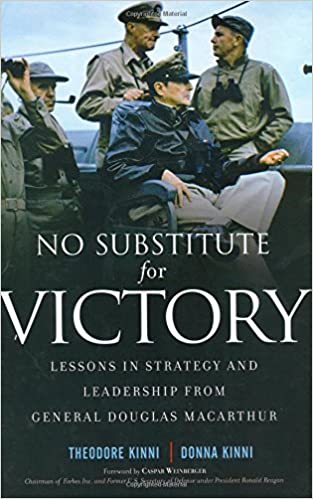No Substitute for Victory – Theodore Kinni and Donna Kinni

“No Substitute for Victory” explores the leadership strategies of the famous U.S. Army General Douglas MacArthur and his approach to achieving victory in both military and non-military situations. The book provides insights on how to apply MacArthur’s leadership principles to business and other domains.
Have a clear vision and communicate it effectively
Douglas MacArthur had a clear vision of what he wanted to achieve in both military and non-military contexts. He communicated that vision with clarity and passion, inspiring others to follow him. As a leader, it’s essential to have a clear vision of where you want to go and how you plan to get there, and to communicate it effectively to your team.
Lead by example
MacArthur believed that leaders should lead by example, setting the tone for their team and demonstrating the behavior they expect from others. Leaders should be role models, demonstrating the values and behaviors they want to see in their team members. They should be willing to work hard, take responsibility for their mistakes, and show integrity in all their actions.
Be decisive and take action
MacArthur was known for his decisiveness, and his willingness to take action even in the face of uncertainty. Leaders should be decisive, and able to make tough decisions quickly and with confidence. They should be willing to take calculated risks and act quickly when necessary.
Never give up
MacArthur was a tenacious leader, known for his persistence and determination. He believed that there was always a way to achieve victory, even in the most challenging circumstances. Leaders should never give up, even when the odds seem stacked against them. They should remain focused on their goals, and be willing to persevere through difficult times.
Develop your team members
MacArthur believed that leaders should invest in the development of their team members, both personally and professionally. He understood that leadership is about serving others, and that helping team members grow and develop was an essential part of that. Leaders should provide opportunities for their team members to learn and grow, and provide feedback and support along the way.
Embrace your role as a leader
MacArthur believed that leaders should embrace their roles fully, with passion and commitment. Leaders should be willing to take risks, make tough decisions, and inspire their teams to follow them. They should be able to articulate a clear vision and create a culture of excellence.
Adapt to changing circumstances
MacArthur was known for his ability to adapt to changing circumstances, both on the battlefield and in his personal life. Leaders should be flexible and adaptable, able to pivot when circumstances change. They should be willing to take risks and make tough decisions, even in uncertain situations.
Communicate effectively
MacArthur was a master communicator, able to convey complex ideas with clarity and simplicity. Leaders should be able to communicate effectively, both in writing and in person. They should be able to tailor their communication style to different audiences, and use language that is clear and concise.
Cultivate a sense of purpose and mission
MacArthur understood the importance of having a sense of purpose and mission, both for himself and for his troops. Leaders should help their team members understand how their work contributes to a larger mission, and create a sense of purpose that inspires them to do their best work.
Foster a culture of excellence
MacArthur believed that leaders should set high standards and foster a culture of excellence. He expected his troops to perform at their best, and he held himself to the same high standards. Leaders should strive to create a culture that supports excellence, and hold themselves and their teams accountable for meeting those standards.

